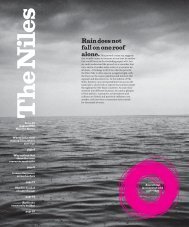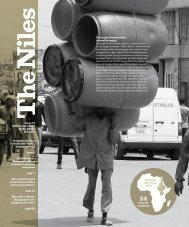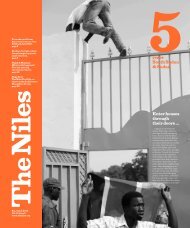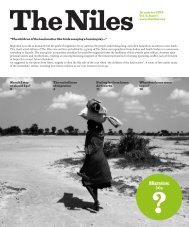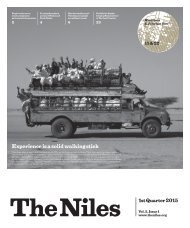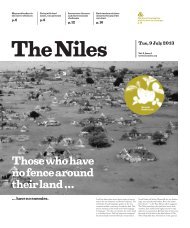When deeds speak, words are nothing
Speaking about sustainable development is easy. Acting sustainably is another matter. And now the evidence is unequivocal: Mankind’s impact on nature is causing the climate to change rapidly and drastically, threatening the environment and the very resources we need to survive. Aware that humanity is careening close to the edge, The Niles correspondents set out to explore where and how people in the Nile Basin region rethink. So much of their findings for now: We are an endlessly innovative species. Cooperation is our superpower. When deeds speak, words are nothing.
Speaking about sustainable development is easy. Acting sustainably is another matter. And now the evidence is unequivocal: Mankind’s impact on nature is causing the climate to change rapidly and drastically, threatening the environment and the very resources we need to survive. Aware that humanity is careening close to the edge, The Niles correspondents set out to explore where and how people in the Nile Basin region rethink. So much of their findings for now: We are an endlessly innovative species. Cooperation is our superpower. When deeds speak, words are nothing.
Create successful ePaper yourself
Turn your PDF publications into a flip-book with our unique Google optimized e-Paper software.
re<think
the way
we use
resources
Dealing with the scourge
of waste
A nonprofit organisation is burning
plastic to create new building materials
– and new jobs for the unemployed.
While it deals with the scourge of
plastic waste, questions remain about
the process and the toxic byproducts
it produces.
20
Waakhe Simon Wudu
Juba, South Sudan
In South Sudan’s capital Juba, a local organisation
tries to address the city’s widespread
pollution problem.
Help Food Security and Livelihoods Africa
(HF-Africa), a local nonprofit organisation
in South Sudan converts biodegradable and
non-biodegradable waste into building materials
and fertilisers, a move that could save
the environment from the negative impacts
of plastics.
The organisation started its work in 2019
to address environmental issues. “We are
targeting climatic change and global warming.
Suppose we don’t care about rubbish, especially
plastic, and make use of it. In that case, our
life will be in danger,” says Godi Swalleh Safi,
Executive Director of Help Food Security and
Livelihoods Africa.
The process
At one of its sites, Kor William, a suburb
south of the capital Juba, the organisation
gathers enormous quantities of garbage, mostly
plastic bottles. The plastic waste is collected
from many other dumping sites in Juba, then
burnt in a metallic container. The waste is then
decomposed into a liquid substance.
The substance is scooped into a moulder
of 20 by 15 centimetres using a spade. Some
dried sand soil is added into the substance in
the moulder and then mixed up using a trowel.
The mixed-up substance is then moulded to
various building materials such as interlocking
bricks, tiles and pavers.
The process of turning the plastics into
a liquid substance “takes much waste,” Godi
Swalleh Safi, the Executive Director of HF-
Africa, says. “For one interlock brick, you need
one full tipper lorry. We don’t only use plastic
bottles. We use old chairs and anything that
can melt we burn,” Safi says.
HF-Africa uses firewood, paraffin and diesel
to create recycled building materials. He says
the biodegradable waste materials such as food
– one of the most prominent types of garbage
littered across the capital – is converted into
fertilisers for kitchen gardens.
The opportunities
Safi says measures such as plastic recycling
could create employment opportunities for
youth by encouraging locals to collect the plastic
waste that HF-Africa buys from them.
So far, HF-Africa has recruited seven volunteers
engaged in various activities such
as weighing the plastic rubbish, taking records,
and monitoring the whole process, Safi says.
Amna Hafis, 26 years old, was redundant
since finishing secondary school a few years
ago. She is a volunteer with HF-Africa, where
she has worked as a secretary for the last two
years. “Being a volunteer is better than when
one is staying at home doing nothing. Now
I’m gaining experience and learning,” she says.
The challenge
One big challenge is the smoke emitted
from the burning of plastics, which is another
form of dangerous pollution.
“When we are burning the plastics, we act
in an organised way. We burn the plastics and
all other materials in one metallic container,
and we cover it. A pipe of three meters long
is connected to the metallic container and takes
smoke from the metallic container into a drum
of water. While the burning takes place, the
“We use old
chairs and anything
that can
melt we burn.”
smoke is absorbed into the water. You would
see the water boiling, but there is nothing
like smoke coming out,” Safi explains, adding,
“if there is smoke coming out, it’s in small
quantity at a time when we are scooping out
the melted plastic from the metallic container
into the moulder”.
The water is then used to clean the streets,
says Safi.
Environmental policy analyst Gizam Moses,
a Project Officer of Civil Society Coalition on
Natural Resources in South Sudan, describes
the HF-Africa undertaking as a “good initiative”.
He says the initiative deserves both private
and public partnership to widen its operations
and help address key environmental issues
and societal issues like unemployment.
He says despite the challenge of managing
the final bi-product – toxic water from the
process, “innovation is a continuous process”,
and HF-Africa would need to devise other
best ways of managing the toxic water. “Even
when you dispose it on the ground or you









